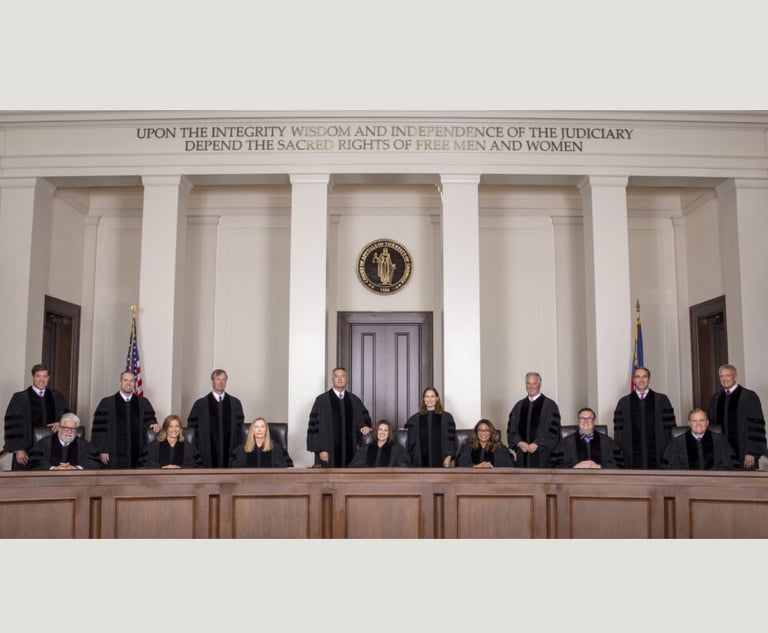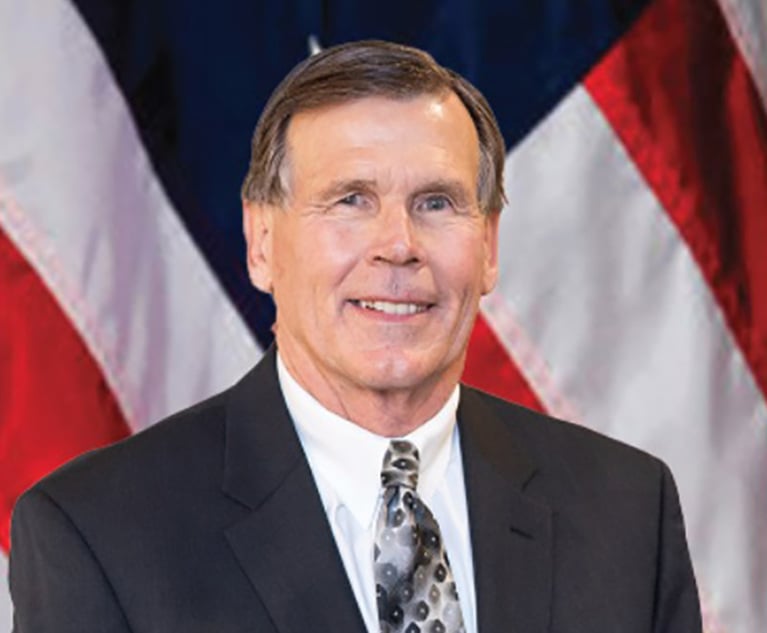 Senator Lindsey Graham (R-SC) walks to a Senate Judiciary Committee meeting, on Wednesday, April 27, 2022. Photo: Diego M. Radzinschi/ALM
Senator Lindsey Graham (R-SC) walks to a Senate Judiciary Committee meeting, on Wednesday, April 27, 2022. Photo: Diego M. Radzinschi/ALM Lindsey Graham, Trying to Quash Subpoena, Denies Election Meddling
Lindsey Graham's lawyers argued in the legal filing that he has "sovereign immunity" from state court procedures pertaining to his job as a senator, as well as constitutional protection because "the testimony sought relates to matters within the legislative sphere."
July 14, 2022 at 11:22 AM
4 minute read
U.S. Sen. Lindsey Graham wasn't seeking to interfere in Georgia's 2020 election when he called state officials to ask them to reexamine certain absentee ballots after President Donald Trump's narrow loss to Democrat Joe Biden, his lawyers said in a federal court filing.
Graham's lawyers made the argument as part of efforts to fight a subpoena compelling the South Carolina Republican to testify before a special grand jury in Georgia that's investigating Trump and his allies' actions after his 2020 election defeat.
"Senator Graham has never inserted himself into the electoral process in Georgia, and has never attempted to alter the outcome of any election," Graham's attorneys wrote Tuesday in court papers filed in South Carolina. "The talk was about absentee ballots and Georgia's procedures."
Graham was one of a handful of Trump confidants and lawyers named in petitions filed last week by Fulton County District Attorney Fani Willis as part of her investigation into what she alleges was "a multi-state, coordinated plan by the Trump Campaign to influence the results of the November 2020 election in Georgia and elsewhere."
In her subpoena petition, Willis wrote that Graham, a longtime Trump ally, made at least two telephone calls to Georgia Secretary of State Brad Raffensperger and members of his staff in the weeks after Trump's loss to Biden, asking about reexamining certain absentee ballots "to explore the possibility of a more favorable outcome for former President Donald Trump."
After their call, Raffensperger told The Washington Post that Graham had asked him whether he had the power to reject certain absentee ballots, a question the official said he interpreted as Graham's suggestion to toss out legally cast votes, an allegation Graham at the time called "ridiculous."
Willis also filed petitions to compel cooperation from former New York Mayor Rudy Giuliani — who was one of Trump's primary lawyers during the failed efforts to overturn the result of the election — as well as lawyers Kenneth Chesebro, Cleta Mitchell, Jenna Ellis, John Eastman and Jacki Pick Deason.
Graham's lawyers argued in the legal filing that he has "sovereign immunity" from state court procedures pertaining to his job as a senator, as well as constitutional protection because "the testimony sought relates to matters within the legislative sphere." They asked the federal judge in the case to quash Graham's subpoena.
"What I'm trying to do is do my day job," Graham said in a statement provided to The Associated Press on Wednesday. "If we open up county prosecutors being able to call every member of the Senate based on some investigation they think is good for the country, we're opening Pandora's Box."
Willis' office didn't immediately respond to a request for comment Wednesday.
Because she is trying to compel testimony from people who live outside of Georgia, Willis had to submit petitions for a judge's approval. The judge overseeing the special grand jury signed off on her petitions.
A judge in Graham's home state will determine whether he is a "material and necessary witness," whether the trip to Atlanta to testify would be an undue burden and whether the subpoena should be issued.
The case was initially assigned to U.S. District Judge Timothy M. Cain, who was Graham's law partner back in the late 1980s and early 1990s. The case was reassigned Wednesday to U.S. District Judge Henry Herlong Jr., who ruled that the subpoena can't be executed for the time being and scheduled a hearing for next Wednesday.
NOT FOR REPRINT
© 2025 ALM Global, LLC, All Rights Reserved. Request academic re-use from www.copyright.com. All other uses, submit a request to [email protected]. For more information visit Asset & Logo Licensing.
You Might Like
View All
Fourth Circuit Seeks More Legal Briefs in Unresolved N.C. Supreme Court Election
4 minute read
Fulton DA Seeks to Overturn Her Disqualification From Trump Georgia Election Case
3 minute read
Experts Not Foreseeing More Rules Governing Prosecutors' Actions After Georgia Court's Removal of DA From Election Case
8 minute read
Law Firms Mentioned
Trending Stories
- 1'Not the President's Personal Lawyer': Lawyers Share Concerns Over How AG Pick Bondi’s Loyalism to Trump May Impact DOJ
- 2US Judge OKs Partial Release of Ex-Special Counsel's Final Report in Election Case
- 3The Demise of Truth and Transparency in Federal Sentencing
- 4Former Phila. Solicitor Sozi Tulante Rejoins Dechert
- 5'I've Seen Terrible Things': Lawyer Predicts Spike in Hazing Suits
Who Got The Work
Michael G. Bongiorno, Andrew Scott Dulberg and Elizabeth E. Driscoll from Wilmer Cutler Pickering Hale and Dorr have stepped in to represent Symbotic Inc., an A.I.-enabled technology platform that focuses on increasing supply chain efficiency, and other defendants in a pending shareholder derivative lawsuit. The case, filed Oct. 2 in Massachusetts District Court by the Brown Law Firm on behalf of Stephen Austen, accuses certain officers and directors of misleading investors in regard to Symbotic's potential for margin growth by failing to disclose that the company was not equipped to timely deploy its systems or manage expenses through project delays. The case, assigned to U.S. District Judge Nathaniel M. Gorton, is 1:24-cv-12522, Austen v. Cohen et al.
Who Got The Work
Edmund Polubinski and Marie Killmond of Davis Polk & Wardwell have entered appearances for data platform software development company MongoDB and other defendants in a pending shareholder derivative lawsuit. The action, filed Oct. 7 in New York Southern District Court by the Brown Law Firm, accuses the company's directors and/or officers of falsely expressing confidence in the company’s restructuring of its sales incentive plan and downplaying the severity of decreases in its upfront commitments. The case is 1:24-cv-07594, Roy v. Ittycheria et al.
Who Got The Work
Amy O. Bruchs and Kurt F. Ellison of Michael Best & Friedrich have entered appearances for Epic Systems Corp. in a pending employment discrimination lawsuit. The suit was filed Sept. 7 in Wisconsin Western District Court by Levine Eisberner LLC and Siri & Glimstad on behalf of a project manager who claims that he was wrongfully terminated after applying for a religious exemption to the defendant's COVID-19 vaccine mandate. The case, assigned to U.S. Magistrate Judge Anita Marie Boor, is 3:24-cv-00630, Secker, Nathan v. Epic Systems Corporation.
Who Got The Work
David X. Sullivan, Thomas J. Finn and Gregory A. Hall from McCarter & English have entered appearances for Sunrun Installation Services in a pending civil rights lawsuit. The complaint was filed Sept. 4 in Connecticut District Court by attorney Robert M. Berke on behalf of former employee George Edward Steins, who was arrested and charged with employing an unregistered home improvement salesperson. The complaint alleges that had Sunrun informed the Connecticut Department of Consumer Protection that the plaintiff's employment had ended in 2017 and that he no longer held Sunrun's home improvement contractor license, he would not have been hit with charges, which were dismissed in May 2024. The case, assigned to U.S. District Judge Jeffrey A. Meyer, is 3:24-cv-01423, Steins v. Sunrun, Inc. et al.
Who Got The Work
Greenberg Traurig shareholder Joshua L. Raskin has entered an appearance for boohoo.com UK Ltd. in a pending patent infringement lawsuit. The suit, filed Sept. 3 in Texas Eastern District Court by Rozier Hardt McDonough on behalf of Alto Dynamics, asserts five patents related to an online shopping platform. The case, assigned to U.S. District Judge Rodney Gilstrap, is 2:24-cv-00719, Alto Dynamics, LLC v. boohoo.com UK Limited.
Featured Firms
Law Offices of Gary Martin Hays & Associates, P.C.
(470) 294-1674
Law Offices of Mark E. Salomone
(857) 444-6468
Smith & Hassler
(713) 739-1250






